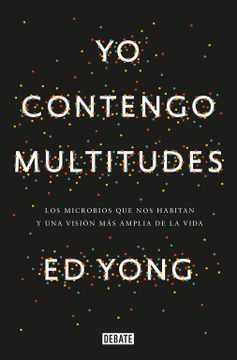Yo Contengo Multitudes: Los Microbios Que Nos Habitan Y Una Mayor Visión de la V Ida / I Contain Multitudes: The Microbes Within Us and a Grander View
Reseña del libro "Yo Contengo Multitudes: Los Microbios Que Nos Habitan Y Una Mayor Visión de la V Ida / I Contain Multitudes: The Microbes Within Us and a Grander View"
Yo contengo multitudes ya es considerado una obra fundamental de ciencia divulgativa -como lo fue en su momento El gen egoísta-. Un libro fascinante y rompedor que cambiará de mil millones de micromaneras nuestra percepción del mundo natural y el espacio que en él ocupamos. El cuerpo humano alberga billones de microbios que conforman todo un mundo en simbiosis con su entorno. Estos microscópicos y multitudinarios compañeros vitales no solo moldean nuestros órganos, nos protegen de enfermedades, e influyen en nuestro comportamiento, sino que resultan clave a la hora de entender el funcionamiento de la vida. En Yo contengo multitudesEd Yong nos abre los ojos y nos invita con su erudición y sentido del humor a mirarnos como algo más que individuos: como receptáculos interdependientes de los microbiomas que conforman todos los seres vivos. Así, descubriremos la asombrosa e invisible ciencia detrás de los gigantescos arrecifes que construyen los corales, aprenderemos cómo ciertos calamares crean juegos de luces, y veremos el modo en que las bacterias pueden alterar nuestra respuesta en la lucha contra el cáncer, manipular nuestro sistema inmunológico, influir en nuestra evolución e incluso modificar nuestro genoma. Bill Gates opina sobre este libro... Después de leer el interesantísimo libro Yo contengo multitudes del periodista británico Ed Yong, veo los microbios con una mirada diferente y hablo de ellos con nuevos términos. [...] Yong sintetiza literalmente cientos y cientos de páginas, sin abrumarte nunca con la ciencia. Tan solo imparte una visión fascinante y sorprendente detrás de otra. Yo contengo multitudes es el mejor periodismo científico. The Blog of Bill Gates ENGLISH DESCRIPTION "A groundbreaking, marvelously informative "microbe's-eye view" of the world that reveals a radically reconceived picture of life on earth. For most of human existence, microbes were hidden, visible only through the illnesses they caused. When they finally surfaced in biological studies, they were cast as rogues. Only recently have they immigrated from the neglected fringes of biology to its center. Even today, many people think of microbes as germs to be eradicated, but those that live with us--the microbiome--are invaluable parts of our lives. I Contain Multitudes lets us peer into that world for the first time, allowing us to see how ubiquitous and vital microbes are: they sculpt our organs, defend us from disease, break down our food, educate our immune systems, guide our behavior, bombard our genomes with their genes, and grant us incredible abilities. While much of the prevailing discussion around the microbiome has focused on its implications for human health, Yong broadens this focus to the entire animal kingdom, giving us a grander view of life. With humor and erudition, Ed Yong prompts us to look at ourselves and our fellow animals in a new light: less as individuals and more as the interconnected, interdependent multitudes we assuredly are. When we look at the animal kingdom through a microbial lens, even the most familiar parts of our lives take on a striking new air. We learn the secret, invisible, and wondrous biology behind the corals that construct mighty reefs, the glowing squid that can help us understand the bacteria in our own guts, the beetles that bring down forests, the disease-fighting mosquitoes engineered in Australia, and the ingredients in breast milk that evolved to nourish a baby's first microbes. We see how humans are disrupting these partnerships and how scientists are now manipulating them to our advantage. We see, as William Blake wrote, the world in a grain of sand. I Contain Multitudes is the story of these extraordinary partnerships, between the familiar creatures of our world and those we never knew existed. It will change both our view of nature and our sense of where we belong in it.

